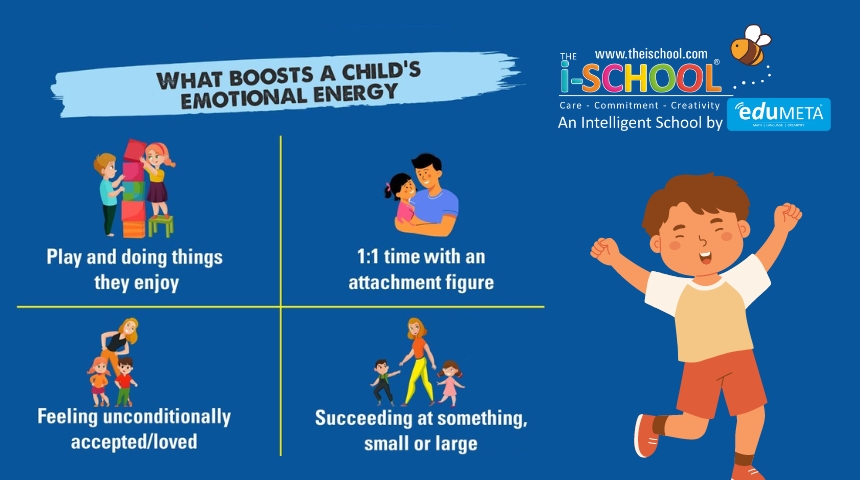What Boosts a Child’s Emotional Energy

Boosting a child’s emotional energy is essential for their overall well-being and development. Emotional energy allows children to navigate challenges, build resilience, and maintain a positive outlook on life. Here are several ways to help boost a child’s emotional energy and ensure they thrive emotionally.
1. Quality Sleep
Adequate sleep is crucial for a child’s emotional health. A good night’s sleep helps regulate mood, improve concentration, and enhance overall emotional resilience.
Solution: Establish a consistent bedtime routine that ensures your child gets the recommended amount of sleep for their age. Create a calming sleep environment free from distractions.
2. Healthy Nutrition
A balanced diet provides the necessary nutrients for brain function and emotional stability. Certain foods can have a direct impact on mood and energy levels.
Solution: Offer a variety of healthy foods, including fruits, vegetables, whole grains, and proteins. Limit sugary snacks and processed foods that can lead to energy crashes.
3. Physical Activity
Regular physical activity is a natural mood booster. Exercise releases endorphins, which can enhance a child’s emotional energy and reduce stress.
Solution: Encourage daily physical activity through play, sports, or family outings. Activities like biking, swimming, or even a walk in the park can be beneficial.
4. Positive Relationships
Strong, supportive relationships with family, friends, and teachers provide emotional security and boost a child’s confidence and well-being.
Solution: Foster open communication and spend quality time together. Encourage positive social interactions and friendships through playdates, team activities, and family gatherings.
5. Creative Expression
Engaging in creative activities allows children to express their emotions, process experiences, and find joy. Art, music, dance, and writing are all powerful outlets.
Solution: Provide opportunities and materials for creative expression. Encourage your child to draw, paint, play an instrument, or engage in imaginative play.
6. Mindfulness and Relaxation
Practicing mindfulness and relaxation techniques can help children manage stress and enhance their emotional energy. Techniques such as deep breathing, meditation, and yoga are effective.
Solution: Introduce simple mindfulness exercises or yoga routines appropriate for your child’s age. Make relaxation a part of their daily routine to help them unwind.
7. Play and Unstructured Time
Free play allows children to explore, imagine, and recharge emotionally. It is essential for their cognitive and emotional development.
Solution: Ensure your child has ample unstructured time to play and explore on their own. Avoid over-scheduling their day and let them enjoy spontaneous activities.
8. Achievement and Positive Feedback
Accomplishing tasks and receiving positive feedback boost a child’s self-esteem and emotional energy. Celebrating successes, big or small, reinforces a sense of competence.
Solution: Set achievable goals and celebrate your child’s efforts and accomplishments. Provide specific praise that highlights their hard work and strengths.
9. Supportive Environment
A stable, nurturing environment where children feel safe and valued boosts their emotional energy. Consistency and routines provide a sense of security.
Solution: Create a predictable and supportive home environment. Establish routines for daily activities and ensure your child feels loved and understood.
10. Learning and Exploration
Encouraging curiosity and a love for learning can energize a child emotionally. Exploring new interests and acquiring new skills contribute to a sense of fulfillment.
Solution: Provide access to books, educational games, and opportunities for hands-on learning. Encourage your child to pursue their interests and ask questions.
11. Nature and Outdoor Time
Spending time in nature has a calming and rejuvenating effect on children. Outdoor activities can improve mood, reduce stress, and enhance emotional well-being.
Solution: Make time for regular outdoor activities such as hiking, picnics, or simply playing in the yard. Encourage your child to explore nature and enjoy the fresh air.
12. Emotional Support and Validation
Listening to and validating a child’s feelings helps them feel understood and valued, boosting their emotional energy. Emotional support from trusted adults is crucial.
Solution: Be an active listener and acknowledge your child’s emotions. Offer empathy and support without judgment, helping them navigate their feelings.
Conclusion
Boosting a child’s emotional energy involves a combination of healthy lifestyle choices, supportive relationships, and opportunities for creative and physical activities. By fostering a balanced and nurturing environment, you can help your child maintain high emotional energy, resilience, and a positive outlook on life. Investing in their emotional well-being today will set the foundation for a happier, more confident, and emotionally healthy future.
